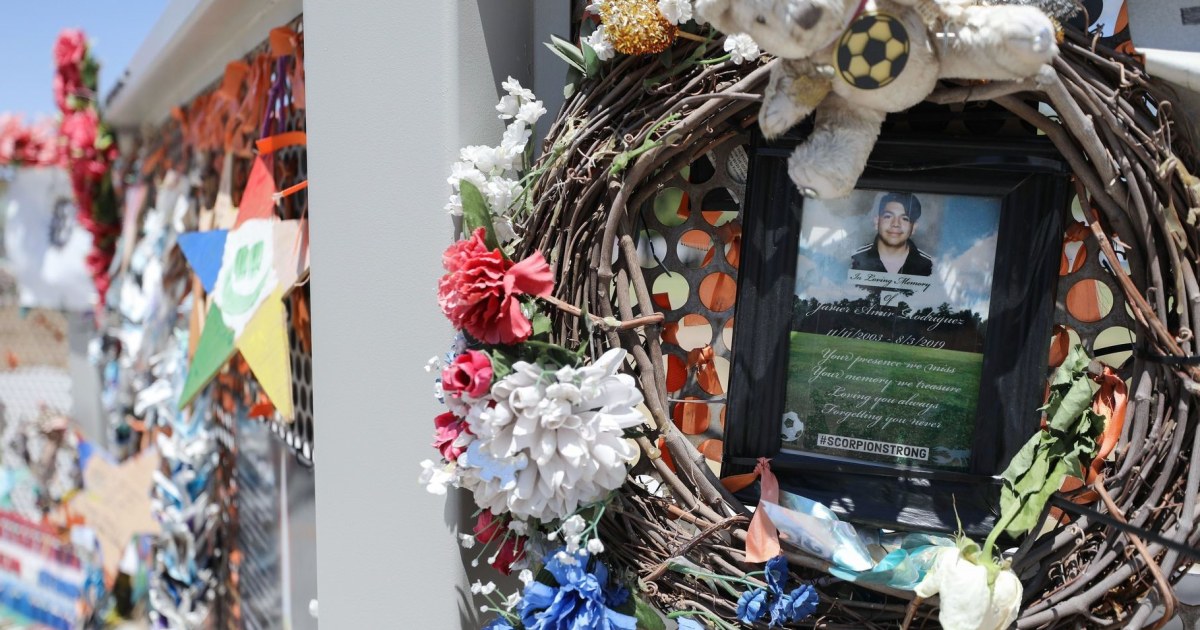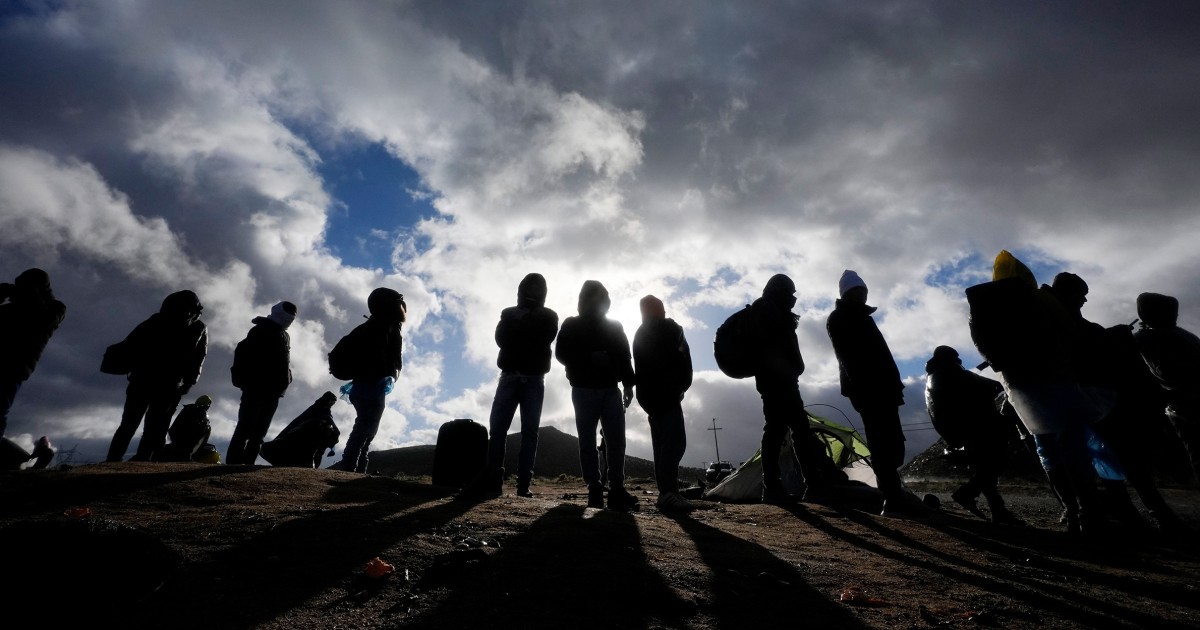📢 Axios Latino is the newsletter that summarizes every Tuesday and Thursday the key news for Latino communities in the hemisphere. You can subscribe by clicking here.
1. The theme to highlight: Behind the strike
Hollywood studio policies aren't particularly popular with many writers: that's why screenwriters of series and movies have been on strike for a week. But according to professionals, the rules are especially problematic because they complicate the incursion into and development in the film industry of Latino, black or Asian or indigenous writers.
Overview: Thousands of writers and screenwriters in Los Angeles and New York went on strike against the Alliance of Film and Television Producers (AMPTP) on May 2. That paralyzed several productions as writers struggle for changes in how they are paid and how they make a living.
- Among the demands of the writers' union, the WGA, are for changes that could help diversify Hollywood's majority-white industry.
- According to analysis, only 1% of the writers of films released in theaters last year were Latino. As for television series, about 6% of those who wrote programs to air in recent years were Hispanic, while Latinos accounted for 3% of writers of pilot series (the first chapters with which it is decided whether or not a series will air), according to a WGA report published last year.
Namely: There are two categories of television writers. Those who develop series before they are released (and do not always premiere) and those who are on the fixed staff of writers of programs already in broadcast. Some get to have both jobs.
- The writers on staff, the writers' room in English, are divided into three levels according to experience and pay.
- It's common for Latino writers to be at the lowest level and especially difficult to move up, Mexican-American screenwriter Victor M. Dueñas tells Axios Latino.
- He says it's mostly because they're most often hired in mini-rooms. These employ far fewer writers than average, serve mostly to plan series before they premiere and therefore usually carry a lower salary per episode and serve less as a cover letter on the resume when sending a job application elsewhere.
Illustration: Shoshana Gordon/Axios
What's going on: The WGA union is demanding that studios hire a base number of writers for each series to prevent mini-rooms from proliferating.
- Dueñas says the structure of the miniature templates is mostly harmful to writers (usually black and Latino) who are just starting out in the industry, because even if they do the pre-work, they are not usually hired since the series premieres or have a salary for the entire season. Usually executive producers and showrunners hire writers they already know best, according to Dueñas.
- The writer Gabriela Revilla Lugo says that there are certain programs for which having mini rooms works, but that they should be "the exception and not the norm".
The other perspective: The AMPTP, which declined to comment for this article, sent a document released last week addressing the WGA's demands and concerns.
- He says the WGA's proposal to hire a minimum number of writers "is like implementing a mandatory quota that is not compatible with the creative nature" of the industry.
In summary: Jorge Rivera, vice president of the Latinx Writers Committee of the WGA (although he clarified that he does not speak on behalf of the entire guild), told Axios Latino that there are still lags even though several studios have made progress in diversifying who they hire behind the camera.
- "Those people, or at least some of them, are not aware of their own biases and that sometimes they don't hire outside of their own group or circle," Rivera says.
2. Why "making it" in Hollywood isn't enough
Even Latino screenwriters who have risen in their careers can end up stagnant due to the compensation and series development models of Hollywood studios, they tell Axios Latino.
Why it matters: That contributes to a lack of diversity among executives and top creatives at Hollywood studios, as well as the type of stories that are told and fidelity to how they are told.
News boost: Writer Lindsey Villarreal tells Axios Latino that there have been more attempts to get diverse people hired as staff writers and writers in recent years. But he adds that the studios haven't made it easy for many of those writers to later get more experience, such as progressing from being theater writers to writing full episodes in which they can receive single credit (useful for topics like award nominations) or growing to become showrunners.
Illustration: Shoshana Gordon/Axios
- With the rise of streaming services, everything has also moved very fast in the industry without "giving us time to grow and develop into leadership positions," says Villarreal. For example, many writers can now only get temporary screenwriting jobs (such as in so-called mini rooms) and thus cannot make a stable living, he adds.
- Since before the COVID-19 pandemic began, several studios stopped allowing writers to visit the set of the series in certain cases, and the WGA says that has diminished the ability of writers to learn more skills that are necessary to direct a series of their own, such as collaboration and contact with directors or actors.
- For example, Villarreal says she was recently a supervising producer for a series but had to do all the work remotely. "That's a big loss for me because it's a muscle that you have to be able to work on constantly," he adds.
Mando Alvarado, who started out as an actor but has been writing professionally for about seven years, says many doors have opened for him since he reached a position as a high-level writer.
- He says he has tried to keep those doors open for others like him to move forward as well, but that doing so is increasingly difficult in the face of budget cuts or when various studios merge and the new leadership makes dizzying changes such as cancellations or removing series from the archive.
- "People are less willing to test a writer they don't know yet, unless that screenwriter is already recommended by someone specific. So you have to push, because if you don't tell [showrunners] to go and hire more non-white women or Latino writers, they don't do it," Alvarado says.
3. Artificial intelligence in Hollywood
Several aspects of the WGA strike are complex and very particular to that industry. But there is one that surely resonates with many workers of all kinds today: the role of artificial intelligence.
Details: The WGA wants the producers association (AMPTP) to regulate the use of AI in projects that are part of joint contracts and to write down that AI should not script directly without human involvement or rewrite literary material as if it were an adaptation.
- The writers' union also wants to make sure that material written in compliance with union contracts cannot then be used to train AI tools to "learn" how to make scripts.
- Some writers also worry that using artificial intelligence in Hollywood will hurt diversification efforts. Previous studies have shown that AI can perpetuate learned stereotypes, for example.
Illustration of Hollywood sign formed by binary code. Photo illustration by Annelise Capossela/Axios. Base photo by Frederic J. Brown/AFP via Getty Images
The other perspective: The studios have rejected the WGA's proposals to leave these issues on artificial intelligence already recorded. They proposed via the AMPTP instead that there be annual meetings to discuss technological advances and their impacts or benefits on the industry.
- The AMPTP has commented that AI "raises important legal and creative questions that are difficult to address", giving the example of what happens if a screenwriter uses ChatGPT as part of his process, because for this there is still not much clarity of how copyright is.
In his own words: Jorge Rivera, the vice president of the Latinx Writers Committee of the WGA's western branch, says many studios are nevertheless pushing for experimentation with AI tools. "I came into ChatGPT to play a little bit and I still don't feel it well formed, but the studios are pushing hard that they want it to work and I feel like that's why they don't want it to be discussed in strike and contract negotiations," he says.
- Christina Piña, a screenwriter who has worked on series such as Charmed, said she was dismayed by the possibility that using AI promotes misrepresentations. "AI has inherent biases. We know that he can lie or misrepresent information and then he will be advocating problems that are systemic in our society regarding racial and ethnic issues," Piña said.
- "AI is bad for diversity," concluded the screenwriter, who is chair of the LatinX Writers Committee, though she said she did not speak for the entire WGA.
4. Wrongful Death in Brownsville
The man who crashed his car into a group of migrants who were at a bus stop in Brownsville, Texas, on Sunday was charged with manslaughter or reckless homicide on Monday, in which authorities are still investigating to determine if the incident was intentional.
News momentum: Police in Brownsville said Monday that George Alvarez faces eight counts of involuntary manslaughter and 10 counts of aggravated assault/assault with viciousness.
- Eight people were killed and several others injured in Sunday's blaze. Most of the victims are from Venezuela.
"I don't have a leg, my dreams have been broken": Texas hit dog survivor tells what he's going through
May 8, 202302:47
In his own words: "We didn't do anything to him... we are all parents, why did he do that to us?" said Euglis Rafael Rivas, who was injured in the crash, told Noticias Telemundo.
- Cruz Herrera, who was also injured, told Noticias Telemundo that the car rammed them at full speed and that the driver was yelling at those at the stop that they were "invading" the United States.
- "We passed a jungle, crossed 8 countries going cold and hungry, thirst [...] And we cross paths here and we say: 'We fulfilled the American dream.' And look where the American dream ended," Daniel Gonzalez, a Venezuelan migrant who had been at the same Brownsville migrant shelter where several of the victims stayed for a few days, told Telemundo 40.
5. Summary of key news in Latin America and the Caribbean
1. Chile's far-right Republican Party won 23 of the 51 seats on the Constitutional Council drafting a new constitution for the country in a vote on Sunday. That was a blow to the progressive government of President Gabriel Boric, who promoted this constituent mechanism.
- The center-left coalition aligned with Boric will have 16 votes in the council, which will have one representative of indigenous peoples and 11 members of other partisan forces.
- The Council must draft a new constitution by December to be put to a plebiscite. The first draft finalized in 2022, written mostly by independents, was rejected at the polls in September.
Relatives of 27 miners killed in Peru demand justice
May 9, 202300:19
2. A fire at a Peruvian gold mine has killed at least 27 people since Saturday, local authorities said as they recovered the bodies Monday.
- The causes of the fire, which is Peru's worst mining disaster in two decades, are being investigated.
6. 👰🏽 Something old, something new, something borrowed, something Mayan
A Guatemalan designer has attracted clients from Texas thanks to her wedding dresses with Mayan motifs.
Details: Each dress designed by Magda Sucely Chuc is unique and hand-woven, and takes about 20 days to make.
The unique wedding dresses with which Guatemalan women honor their Mayan roots
April 26, 202302:06
- More than 100 experts in handmade clothing and embroidery work are employed for each dress, Chuc tells Noticias Telemundo.
- Chuc also uses social media to sell other pieces such as huipiles and wallets.
In his own words: "That's how we create dresses and they wear them there with their heads held high saying: 'we are Guatemalans, we are of Mayan roots,'" Chuc tells Noticias Telemundo.
Thanks for reading! We returned on Thursday.
If you want to share your experiences or send us suggestions and comments, send an email to axioslatino@axios.com.
Do you want to read any of the previous editions?
Experts Call for 'Rethinking Mental Health Care' as Depression, Anxiety and Suicides Among Latinos Rise
Harsher Punishment for Being Latino: Study Says They're More Likely to Get Prison Sentences
Alert for viral outbreaks by mosquitoes that travel more thanks to climate change







/cloudfront-eu-central-1.images.arcpublishing.com/prisa/QMXRJQDXWRGJ3PNGSRPXHYITDU.jpg)

